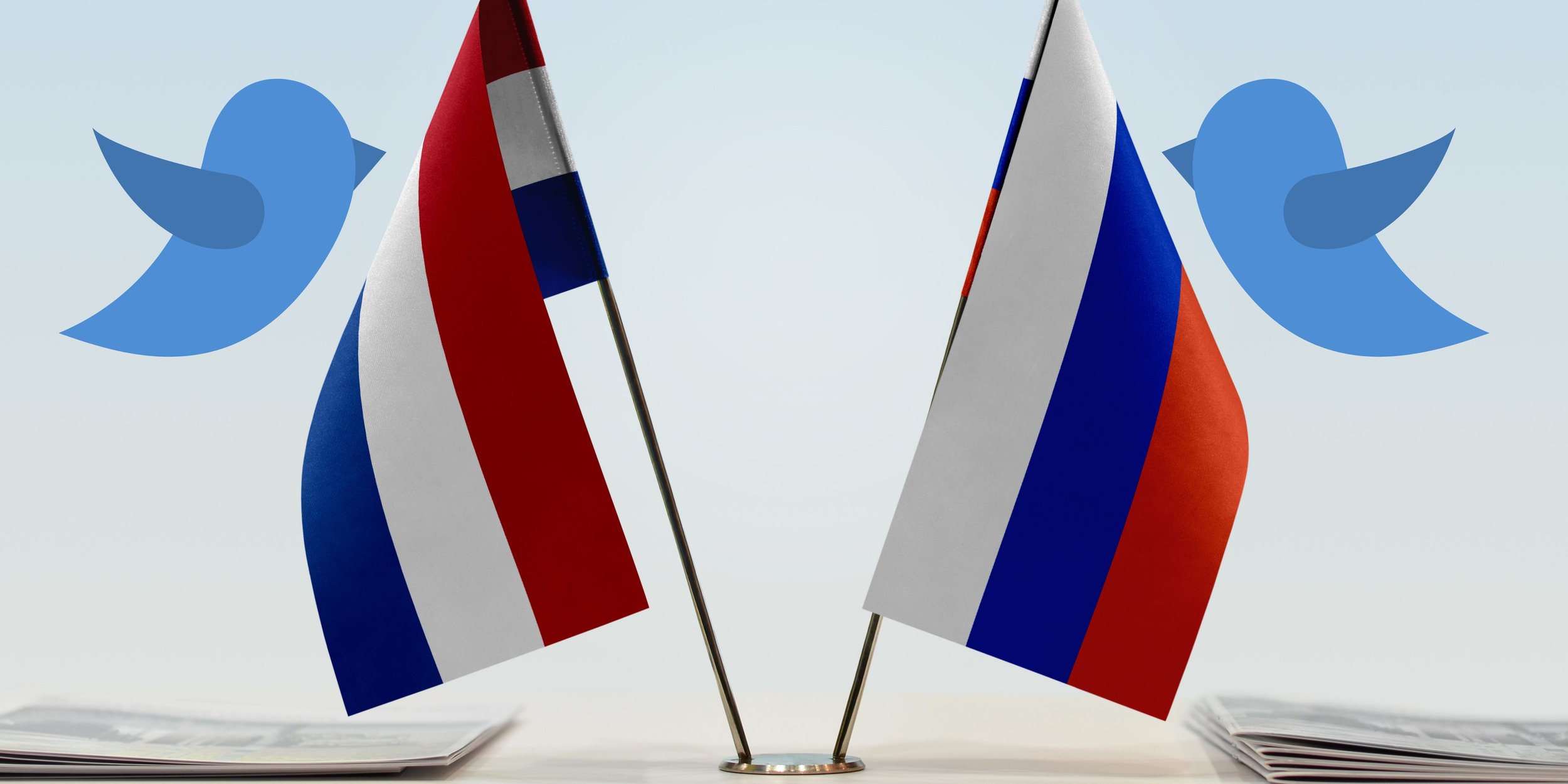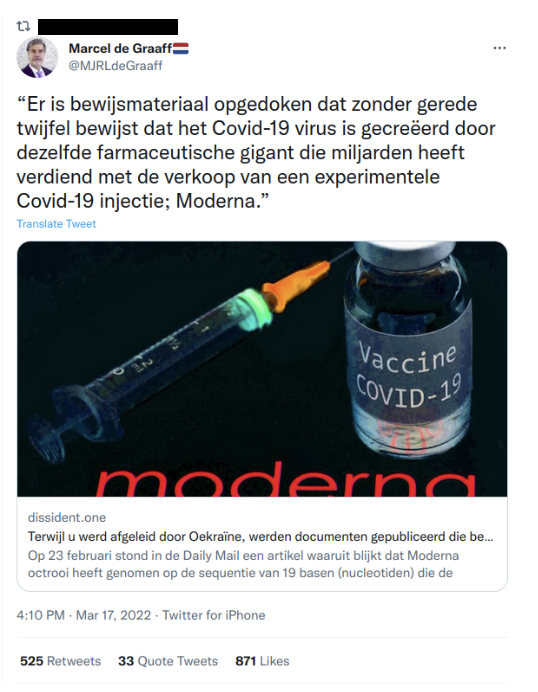
An analysis of Dutch pro-Russia tweets
April 12, 2022
Data collection
With the help of keywords (‘istandwithrussia’, ‘poetin+held’, etc.) we identified 100 active, Dutch, pro-russia Twitter accounts spreading conspiracy theories about the Russia-Ukraine war. Some of these accounts tweet almost exclusively pro-Russia messages, while other accounts mix pro-Russia tweets with other conspiracy theories and misinformation. We have anonymised any accounts that are not of public figures or verified (blue-tick) accounts.
From these accounts we gathered 197K+ tweets since the start of the Russia-Ukraine war (24-02-2022) with a mean of 2.314 tweets per day and a mean 157 retweets per tweet. 43K+ of these tweets referred explicitly to the war (mentioned Russia, Ukraine, Putin or Zelensky) with a mean of 412 tweets per day and a mean of 277 retweets per tweet. Tweets related to the war got significantly more retweets.
The peak in retweets at March 17 seems to be mainly caused by tweets spreading parts of Putin's speech of March 16 with (false) English subtitles. Some of these tweets went exuberantly viral hitting over 26K retweets. To a lesser extent, some Dutch tweets went viral that day too: a tweet claiming refugees were not fleeing for the Russian invasion, but for the Ukrainian Azov bataljon got retweeted 833 times and a tweet by Marcel de Graaff, a Dutch member of the European parliament representing Forum voor Democratie, claiming the war is only a distraction from the publication of proof that Covid-19 was created in a lab got 525 retweets that day.
Figure 1: Total number of tweets and mean retweets per tweet, per day, by 100 Dutch pro-Russia accounts, over 3 weeks.
Figure 2: Number of Russia-Ukraine war related tweets and mean retweets per tweet, per day, by 100 Dutch pro-Russia accounts, over 3 week.
Figure 3: parts of Putin’s March 16th speech with (false) subtitles going viral, causing a peak of retweets among Dutch pro-russia accounts.
Figure 4: Dutch viral tweet claiming Ukrainian refugees are not fleeing the Russian invasion, but the Ukrainian Azov bataljon.
Figure 5: Dutch viral tweet by Marcel de Graaff, claiming the war is a distraction from the publication of proof that Covid-19 was created in a lab.
Sentiment
When we measure the sentiment of tweets mentioning either Ukraine or Russia, we do not detect a significant difference between the two except for tweets that appeared around March 17, 18 and 19. We assume that these are after effects of Putin's speech of March 16. We also measure positive sentiment around reports that claim Russia is working together with other BRIC nations on reforming the petrodollar and that the Western media is finally agreeing with Putin.
Figure 6: Measuring sentiment of tweets by Dutch pro-Russia accounts, mentioning either Russia or Ukraine throughout the month March.
Figure 7: Positive sentiment in tweets mentioning Russia: tweets claiming Russia is reforming the Petrodollar.
Figure 8: Positive sentiment in tweets mentioning Russia: tweets claiming the Western media is finally agreeing with Putin.
Topics
We made a network-analysis of the 5000 most popular words (minus stop words) used together in tweets referring to the Russia-Ukraine war by Dutch pro-russia accounts. This way we were able to find out which topics were discussed most. The more popular the words the bigger the words are shown in the network. We distinguished 9 frequently recurring topics:
Nazism: Ukraine needs to be cleansed of neo-nazis and/or the Azov bataljon consisting of neo-nazis.
Biden: Joe Biden and/or Hunter Biden somehow gain profit from the war.
Biolabs: Biolabs are present in Ukraine where Covid-19 and/or bioweapons are manufactured.
Refugees: anti-refugee narratives.
Great reset: The war is a planned part of the Great Reset.
(Satanic) paedophiles: Ukraine is the centre of child trafficking and provides children for satanic rituals that include paedophilia and child- abuse and murder.
Soros: The world elite (George Soros, the Rothschilds, the Rockefellers, etc.) have planned this war.
War crimes: The Ukrainian army is committing war crimes such as bombing their own people and torturing and/or murdering Russian prisoners of war.
Antisemitism: The Jewish elite (Khazarian/Zionist maffia) has planned this war.
Figure 9: Network-analysis of the 5000 most popular words used together in tweets referring to the Russia-Ukraine war made by Dutch pro-Russia accounts. The bigger the words, the more frequent they occur in tweets. I.a. ‘biden’, ‘nazi’, ‘azov’, ‘biolabs’, ‘trump’ and ‘soros’ stand out.
Figure 10: Pie Chart of topic distribution in tweets referring to the Russia-Ukraine war made by Dutch pro-Russia accounts.
Figure 11: Top 25 most frequently used uncommon words (words that do not occur in the top 50.000 most used Dutch words and that are not ‘Rusland’, ‘Oekraine’, ‘Poetin’, ‘Putin’ or ‘Zelensky’)
Mentions, hashtags, likes and retweets
We plotted the most mentioned accounts, most liked accounts, most retweeted accounts, and most used hashtags (hashtags that do not directly mention Russia, Ukraine, Putin or Zelensky) in tweets referring to the Russia-Ukraine war made by Dutch pro-Russia accounts. In the top 5 mentions we find: @thierrybaudet, @wierdduk, @joostniemoller, @frontnieuws and @telegraaf. In the top 5 likes we find: thierrybaudet, KAFKA_Dev, JoostNiemoller, PVanHouwelingen, and one other anonymised. In the top 5 hashtags we find: #biolabs, #rutte, #wef, #oorlog and #baudet. Interesting is #giro555 at the 7th place. This is the Dutch national bank account number for charities and many tweets claim that money raised is used wrongly. In the top 5 most retweeted accounts we find: thierrybaudet, JoostNiemoller, KAFKA_Dev and rblommestijn, and another anonymised.
Thierry Baudet and Pepijn Van Houwelingen are members of the Dutch populist right wing party Forum voor Democratie. [REDACTED 2022-07-14] and Joost Niemoller are Dutch journalists who in recent years have become a mouthpiece for the alt-right community. Raisa Blommestijn is a Dutch rightwing philosopher. Frontnieuws is a Dutch alternative news outlet and Kafka is a Dutch rapper known to spread conspiracy theories and misinformation online.
Figure 12: Top 25 hashtags (Top 25 liked accounts, mentioned accounts, and retweeted accounts have been redacted as they include too many unofficial accounts).
Network analysis of mentions & replies
From a dataset consisting of 15M+ Dutch tweets randomly collected in January, February and March 2022, we made a network-analysis of the 30.000 accounts that were most often mentioned together and that most often replied to each other. This gave us a Neutral network of the activity in the Dutch Twitter landscape. The nodes and edges of Dutch pro-Russia accounts (from the 100 we collected) that were present in the network, were given a red colour. This visualised that Dutch pro-russia accounts cluster around Forum voor Democratie accounts and the account of rapper Kafka.
Figure 13: Neutral network-analysis of the Dutch Twitter landscape based on mentions and replies. Red nodes represent Dutch pro-Russia accounts. (Thierry Baudet is the most mentioned and replied to account in general)
When we only map our 100 Dutch pro-Russia accounts in a network based on mentions and replies, again we see the account of Thierry Baudet dominating the centre, while @thierrybaudet was not included in our pro-Russia accounts. This means the account of Baudet is one of the most mentioned and replied to accounts for all Dutch pro-Russia accounts.














